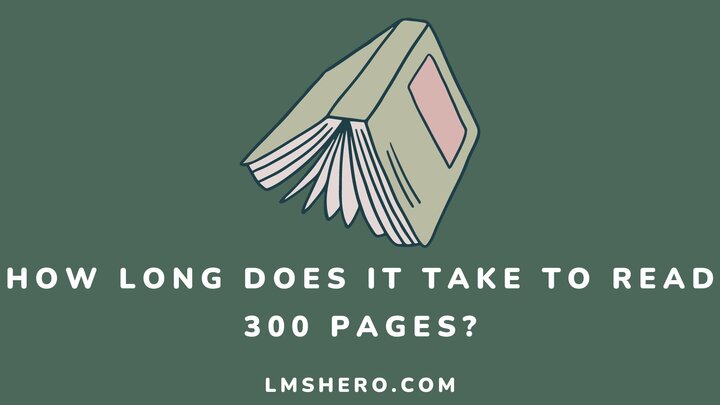How long it takes you to read 300 pages depends on your average reading speed, your age, and the type of material you are reading. What does this imply? It means adults are expected to read at a faster rate than children.
Technical materials such as scientific papers and operating manuals may require extra time to read and comprehend. On average, you are expected to complete a 300-page book in less than 9 hours.
This estimate works for people reading at a minimum speed of 300 words per minute (wpm). For technical or complex publications, your speed may be reduced to about 125-150 words per minute.
Moving on in this guide, you will learn more about the various types of readers, their speed, different reading techniques, and tips you can adopt to improve your reading experience.
Different Types of Readers & Their Speed

1. A slow reader
Slow readers read at a speed between 125 to 200 words per minute. At this rate, they are expected to finish reading a book with 300 pages between 12.5 to 20 hours.
2. A fast reader
A fast reader reads at a speed closer to 400 words per minute. This type of reader wraps up 300 pages in less than 7 hours (about 6.3 hours).
However, if the book is technical, it may demand a few extra hours.
What is The Normal Speed for Reading?
Now that you know what it means to be a fast and slow reader, you should be curious to know if there is a default or average speed. The average reading speed for most individuals is about 300 words per minute.
The normal reading speed for anyone would depend on why and in what way they are reading. If you are reading a 300-paged book leisurely, you may need more than 20 hours for the entire reading session.
Major Reading Techniques
How fast you read also depends on your reading method. Here are the different ways you can read a book:
1. Skimming
Skimming is a very fast approach to reading. It is often regarded as a form of gist reading where only the main idea of the content is what interests the reader.
When you are skimming, you are not reading or pronouncing each word. Your focus is to have a clue about the main theme of the text. This reading technique can come in handy during time-restricting assessments or examinations.
Skimming is a common practice for reading newspapers or magazines. It takes about 2 hours to read 300 pages by skimming.
2. Scanning
Unlike skimming, scanning is a technique used in fishing out a piece of information, not just the theme of a text. In other words, the act involves accepting only information you are interested in.
Scanning is a bit slower compared to skimming because it requires you to quickly look through each word to determine the ones relevant to your cause.
It takes about 3 – 4 hours to read 300 pages by scanning.
3. Intensive reading
Intensive reading requires spending ample time with a text and is more time-consuming than the previous techniques. The goal of intensive reading is to fully grasp the entire message in a book, hence, it requires understanding every word in the text.
It takes about 9 to 10 hours to read 300 pages by intensive reading.
4. Extensive reading
Extensive reading is preferential reading. It is an out-of-classroom technique that involves reading with pleasure or without urgency.
The focus here is on fluency, not accuracy because you are fully in control of which book you read.
It takes about 15 to 20 hours to read 300 pages via extensive reading.
How to Improve Your Reading Skill
There are different ways you can sharpen your reading ability. If you are a scholar, a professor, or an employee whose profession requires constant reading; these tips can help:
1. Create a plan that suits your style
Having a plan before you start reading a book will help you break reading into chunks. Bigger chunks are ideal for fast readers while slow readers should stick to smaller chunks.
When reading in chunks, what matters is the estimated number of hours you give yourself to wrap up. In other words, you can read in big chunks and still end up second-fiddle to a slow reader.
What matters most is leveraging your reading style or personality.
2. Lookout for pivotal words
Every text or book features phrases, conjunctions, and pivotal words that can help you quickly understand what is coming next. A good understanding of what is coming next is great for your reading experience and will speed up your reading when your guess is right.
Repetitive words like “in other words” usually depict the repetition of information using different words. Hence, you can easily skim.
Cause and effect words such as “therefore” and “consequently” are designed to reflect the possible outcome of an action. At some point in your reading, you should be able to predict these possible outcomes and read at a faster rate.
Other pivotal aspects of a book that can improve your reading include summarizing words like “in conclusion” or “summarily”.
3. Understand that reading speed will always vary
A lot of factors affect reading. This means you must accept the fact that the reading rate will vary depending on the mood, environment, material, and more.
Being flexible or shifting gears while reading does not mean you are a bad reader. The best time to increase your speed is when you are in familiar territories or a book features recurrent illustrations or examples.
However, when you start encountering unfamiliar words, long sentences, paragraphs, or the general context of a section, it is ideal to lower your pace.
This allows you to pay extra attention to words and important information you must comprehend.
Understanding this phenomenon will help you know when to read slowly and when to be very fast. In turn, it will improve your speed and ability to pay attention.
FAQs
Can you read a 300-page book in a day?
You can read a 300-page book in a day if there is an urgency or if it is a book you really like.
However, reading in chunks and spending a few hours a day with a book remains the best way to read.
How many pages is a 30-minute read?
After 30 minutes of reading, you should be on the 15th to 20th page of any book at the very least.
Please note that you must be reading at or close to 300 words per minute to achieve this.
Is reading for 3 hours a day good?
Reading for 3 hours a day is good for your brain and will make you a better reader.
Scholars are advised to spend at least 2 hours on coursework and an extra hour on materials that interest them.
What happens if you read every day?
Reading every day will make you a better reader.
This will also positively influence your critical thinking, ability to memorize, and general vocabulary.
Is reading better at night or morning?
It is better to read in the morning than at night.
Most people practice reading in the morning because their brain assumes a refreshed state and will be better stimulated.
Conclusion
Reading is unavoidable and fundamental to every human’s growth and development. How long it takes you to read 300 pages depends on your style of reading, the type of material you are reading, and why you are reading.
The more you read and understand yourself, the better you also become. I hope you found this guide helpful.
Now that you know the average time it takes to devour 300 pages, it is crucial to also know how you can increase your IQ as it plays a role in how fast you grasp information.
Thanks for reading.







